Showing 73–84 of 110 results
-
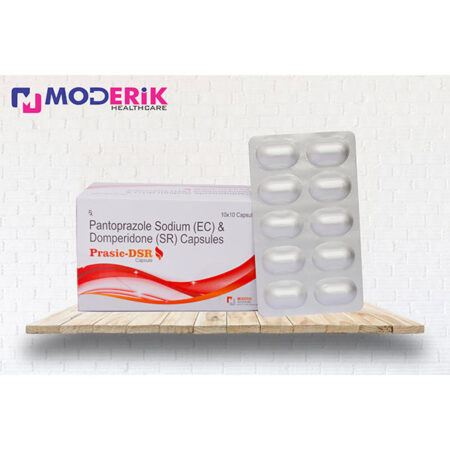
PRASIC-DSR
Read more- You have been prescribed Prasic-DSR Capsule for the treatment of acidity and heartburn.
- Take it one hour before the meal, preferably in the morning.
- It is a well-tolerated medicine and provides relief for a long time.
- Inform your doctor if you get watery diarrhea, fever or stomach pain that does not go away.
- Inform your doctor if you do not feel better after taking it for 14 days as you may be suffering from some other problem that needs attention.
-

RICFEM-DROPS
Read moreUses of RICFEM Drops:
- Treatment of Anemia: RICFEM drops are primarily used to treat iron deficiency anemia, which can result from insufficient dietary intake of iron, chronic blood loss, or increased iron requirements during pregnancy and growth periods.
- Prevention of Iron Deficiency: They help prevent iron deficiency in individuals who may not get enough iron from their diet, such as children, pregnant women, and those with malabsorption disorders.
- Support During Pregnancy: The combination of ferrous ascorbate (iron), folic acid, and zinc is beneficial for pregnant women to support fetal development and prevent birth defects.
- Immune Support: Zinc plays a role in maintaining a healthy immune system, aiding in the prevention and treatment of infections.
Side Effects of RICFEM Drops:
- Gastrointestinal Issues: Common side effects include nausea, vomiting, constipation, diarrhea, and abdominal pain. These are often due to the iron component.
- Dark Stools: Iron supplements can cause darkening of the stools, which is generally harmless but may be mistaken for gastrointestinal bleeding.
- Allergic Reactions: Some individuals might experience allergic reactions, such as rash, itching, or swelling, especially if they are sensitive to any of the ingredients.
- Metallic Taste: A metallic taste in the mouth is a potential side effect of iron supplements.
- Overdose Risk: Accidental overdose, particularly in children, can lead to serious toxicity. Symptoms of overdose include severe nausea, vomiting, dizziness, and even organ damage in extreme cases.
- Interactions with Other Medications: Iron supplements can interfere with the absorption of certain medications, such as antibiotics and thyroid medications. It’s important to discuss with a healthcare provider if taking other drugs.
Precautions:
- Proper Dosage: Always follow the prescribed dosage to avoid the risk of overdose.
- Take with Food: To minimize gastrointestinal side effects, take RICFEM drops with food.
- Consult a Healthcare Provider: Before starting the supplement, especially if there are existing medical conditions or other medications being taken.
- Storage: Keep out of reach of children to prevent accidental ingestion and potential overdose.
-

-
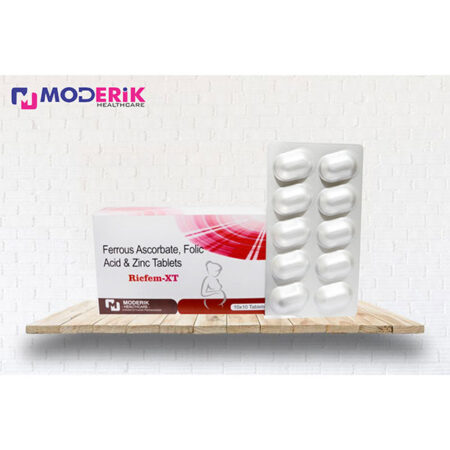
RICFEM-XT-TAB
Read moreSALT COMPOSITION
Ferrous Ascorbate (100mg) eq.to elemental iron 30mg + Folic Acid (1.5mg)
USES OF RICFEM-XT TABLET
Treatment of Iron deficiency
Treatment of Anemia
-
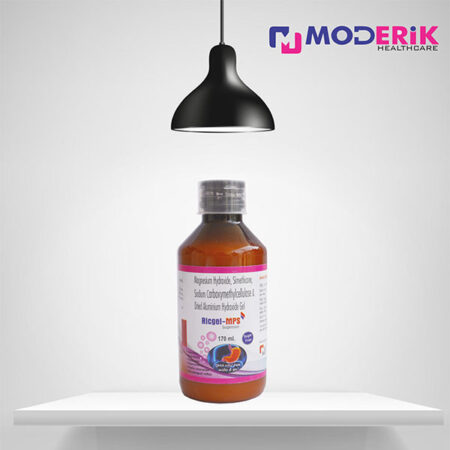
RICGEL-MPS
Read moreUses of RICGEL-MPS
RICGEL-MPS is a combination medication containing Magnesium Hydroxide, Simethicone, Sodium Carboxymethylcellulose, and Dried Aluminium Hydroxide. It is primarily used to treat conditions related to excess stomach acid and gas. Here are its primary uses:
- Antacid:
- Magnesium Hydroxide and Dried Aluminium Hydroxide: These ingredients neutralize stomach acid, relieving symptoms of acid indigestion, heartburn, and upset stomach.
- Anti-flatulent:
- Simethicone: This ingredient helps reduce bloating, discomfort, and pain caused by excessive gas in the digestive tract by breaking up gas bubbles.
- Protective agent:
- Sodium Carboxymethylcellulose: This ingredient acts as a protective agent for the stomach lining, helping to manage symptoms related to ulcers or gastritis.
Side Effects of RICGEL-MPS
While RICGEL-MPS is generally safe when taken as directed, it may cause some side effects. Common and rare side effects include:
Common Side Effects:
- Constipation:
- This can occur due to the aluminium hydroxide content.
- Diarrhea:
- Magnesium hydroxide can have a laxative effect in some individuals.
- Nausea:
- Some people may experience nausea as their body adjusts to the medication.
- Stomach Cramps:
- Occasional stomach cramps may occur, particularly if taken in high doses.
Rare Side Effects:
- Allergic Reactions:
- Symptoms may include rash, itching, swelling, dizziness, or difficulty breathing. Immediate medical attention is required if any of these symptoms occur.
- Electrolyte Imbalance:
- Prolonged use or overuse can lead to imbalances such as hypermagnesemia or hypercalcemia, especially in patients with kidney problems.
- Aluminium Toxicity:
- Overuse can lead to aluminium toxicity, particularly in individuals with renal impairment. Symptoms may include confusion, muscle weakness, bone pain, or seizures.
- Hypophosphatemia:
- Aluminium hydroxide can bind with phosphate, leading to low levels of phosphate in the blood, causing weakness, bone pain, or other related issues.
Important Precautions:
- Renal Impairment: Patients with kidney issues should use this medication cautiously due to the risk of accumulating magnesium and aluminium.
- Pregnancy and Breastfeeding: Consult a healthcare provider before use, as the effects on an unborn baby or nursing infant are not well-documented.
- Drug Interactions: RICGEL-MPS can interact with other medications by affecting their absorption. It’s important to maintain a gap between taking this antacid and other medications.
Conclusion
RICGEL-MPS can effectively relieve symptoms associated with excess stomach acid and gas. However, like all medications, it should be used as directed to minimize the risk of side effects. Always consult with a healthcare provider if there are any concerns or unusual symptoms.
- Antacid:
-
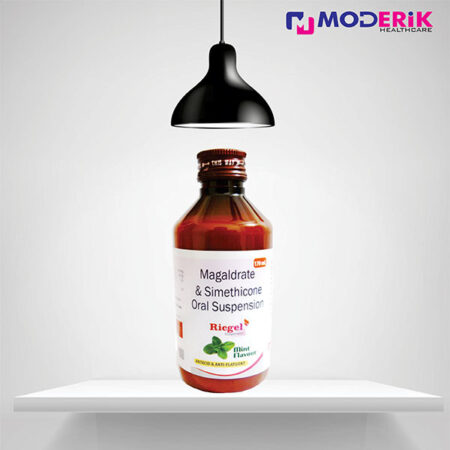
RICGEL-SUSP.
Read more- It is better to take it after food or as suggested by the doctor.
- Some healthy tips to prevent acidity from happening:
- Avoid taking hot tea, coffee, spicy food, and chocolate. Instead, have cold milk and cold coffee as these help neutralize the acid in the stomach.
- Avoid alcohol and smoking.
- Avoid eating late at night or before bedtime.
- Do not take Ricgel Oral Suspension Mint at least 2 hours before or after taking other medicines. It may interact with other medicines.
-
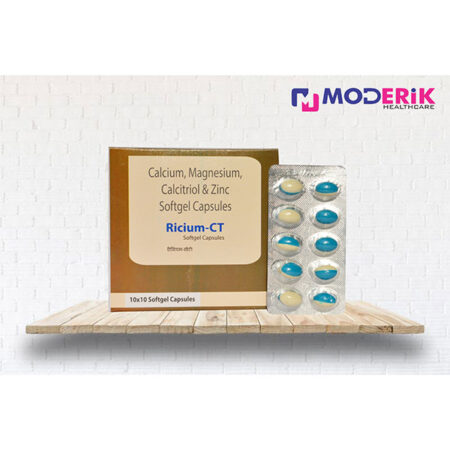
-
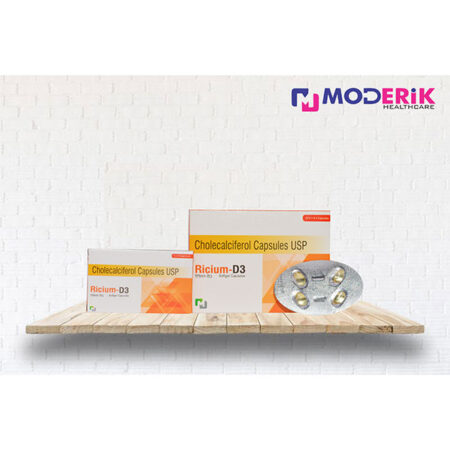
-
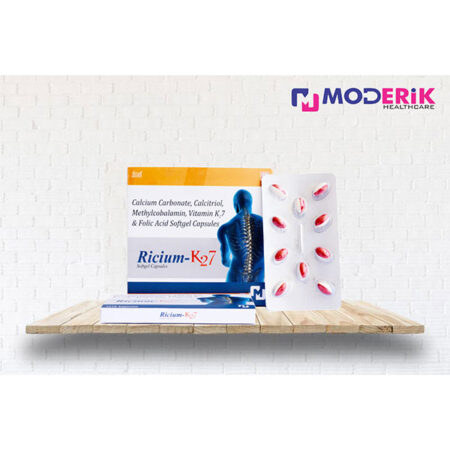
RICIUM-K27
Read moreUses of Ricium-K27 (Calcium Citrate Maleate, Calcitriol, Magnesium, Zinc Soft Gel)
- Bone Health:
- Calcium Citrate Maleate: Enhances calcium absorption and is used to prevent or treat low blood calcium levels in people who do not get enough calcium from their diets. It’s vital for maintaining strong bones and preventing conditions like osteoporosis.
- Calcitriol: Active form of Vitamin D that helps in the absorption of calcium and phosphorus from the stomach and the proper functioning of the body.
- Magnesium: Important for bone structure as it helps in the formation of bone and also in maintaining bone density.
- Zinc: Essential for bone tissue renewal and repair, and it plays a role in the formation of bone matrix.
- Muscle Function:
- Magnesium: Helps in muscle contraction and relaxation.
- Calcium: Necessary for proper muscle function, including the contraction of heart muscles.
- Immune Support:
- Zinc: Vital for a healthy immune system, aiding in the development and function of immune cells.
- Metabolism Support:
- Magnesium: Plays a role in over 300 enzyme reactions, including the metabolism of food and the synthesis of proteins and fatty acids.
Side Effects of Ricium-K27 (Calcium Citrate Maleate, Calcitriol, Magnesium, Zinc Soft Gel)
- Common Side Effects:
- Gastrointestinal Issues: Nausea, vomiting, constipation, or diarrhea.
- Metallic Taste: A temporary metallic taste in the mouth.
- Calcium Citrate Maleate:
- Hypercalcemia: Too much calcium in the blood, leading to symptoms such as fatigue, nausea, and confusion.
- Kidney Stones: Increased risk of developing kidney stones with high calcium intake.
- Calcitriol:
- Hypercalcemia: Same as above, as calcitriol increases calcium absorption.
- Headache: May cause headaches or dizziness in some individuals.
- Magnesium:
- Diarrhea: High doses of magnesium can cause diarrhea.
- Abdominal Cramping: May lead to stomach cramps or bloating.
- Zinc:
- Nausea: Especially if taken on an empty stomach.
- Copper Deficiency: Long-term use can interfere with copper absorption, leading to deficiency.
Precautions and Interactions
- Kidney Disease: People with kidney disease should consult their doctor before taking supplements containing calcium, magnesium, or vitamin D.
- Medications: These supplements can interact with certain medications, such as antibiotics, diuretics, and heart medications. Always consult a healthcare provider before starting any new supplement.
- Dosage: Adhere to the recommended dosage to avoid potential side effects or toxicity.
Conclusion
Ricium-K27 soft gels are beneficial for bone health, muscle function, immune support, and overall metabolism but must be taken with caution to avoid potential side effects, especially when taken in high doses or for prolonged periods. Always consult a healthcare provider for personalized advice.
- Bone Health:
-
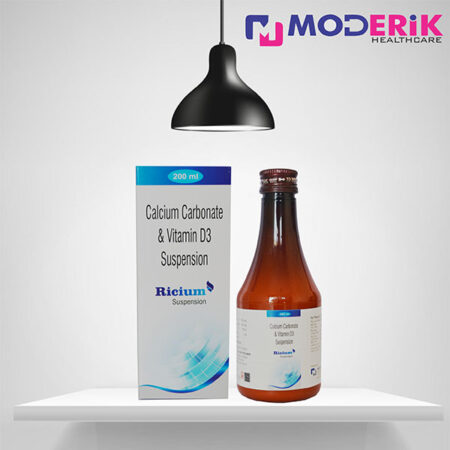
RICIUM-SYRUP
Read moreUses of Ricium Syrup:
- Calcium Supplementation:
- Purpose: Ricium Syrup is primarily used as a calcium supplement. Calcium carbonate provides calcium which is essential for the development and maintenance of healthy bones and teeth.
- Indication: It is used to treat or prevent calcium deficiencies. This is especially important for individuals who do not get enough calcium from their diet, such as those with osteoporosis, osteomalacia, or rickets.
- Vitamin D3 Supplementation:
- Purpose: The syrup also contains Vitamin D3 (cholecalciferol), which helps the body absorb calcium efficiently.
- Indication: It is used in conditions requiring Vitamin D3 supplementation, such as vitamin D deficiency, certain bone disorders (like osteomalacia or rickets), and to support overall bone health.
- Bone Health:
- Purpose: The combination of calcium and Vitamin D3 helps maintain strong bones and may reduce the risk of fractures.
- Indication: It is beneficial for postmenopausal women, elderly individuals, and people with conditions that affect bone density and strength.
Side Effects of Ricium Syrup:
- Common Side Effects:
- Constipation: Calcium supplements can cause constipation.
- Gas and Bloating: Some individuals may experience gas or bloating.
- Upset Stomach: Gastrointestinal discomfort, including nausea and vomiting, may occur.
- Less Common Side Effects:
- Hypercalcemia: Excessive calcium intake can lead to hypercalcemia (high levels of calcium in the blood), which may cause symptoms like nausea, vomiting, confusion, and frequent urination.
- Hypercalciuria: High levels of calcium can lead to hypercalciuria (high levels of calcium in the urine), potentially increasing the risk of kidney stones.
- Allergic Reactions: Though rare, some people may experience allergic reactions, such as rash, itching, swelling, severe dizziness, or trouble breathing.
- Serious Side Effects:
- Cardiovascular Issues: High levels of calcium can affect the heart and cause issues such as irregular heartbeats.
- Kidney Problems: Prolonged use of high doses can lead to kidney problems, including the formation of kidney stones.
Precautions:
- Medical History: Inform your doctor if you have a history of kidney disease, heart disease, or high levels of calcium in the blood or urine.
- Medication Interactions: Calcium and Vitamin D3 can interact with other medications, such as certain diuretics, antacids, and medications for heart disease or epilepsy. It is important to inform your healthcare provider of all the medications you are taking.
- Dosage: Follow the recommended dosage as excessive intake can lead to serious side effects.
Always consult with a healthcare professional before starting any new supplement to ensure it is appropriate for your individual health needs and conditions.
- Calcium Supplementation:
-
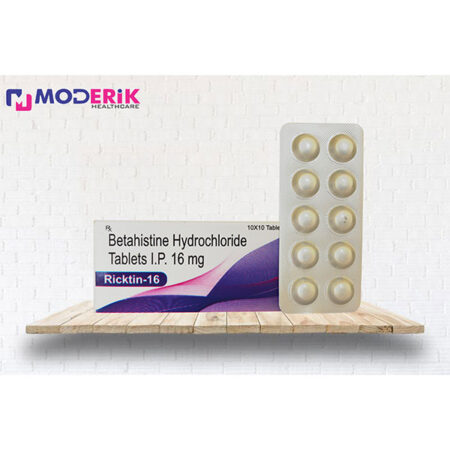
RICKTIN-16-TAB
Read more- You have been prescribed Ricktin 16 Tablet to relieve vertigo (dizziness), hearing problems and tinnitus (noise in the ear) associated with Ménière’s disease.
- It can only decrease the number and severity of attacks but may not completely stop them.
- Taking it with food can help reduce stomach problems.
- Take it at the same time each day to maintain a steady amount of the medicine in your body.
- Inform your doctor if you have a history of stomach ulcer, asthma, or low blood pressure.
-
Inform your doctor if you are pregnant, planning pregnancy or breastfeeding.
- Do not stop taking the medicine suddenly without talking to your doctor first.
-

RICLAK-CAP
Read moreCOMPOSITION
PREBIOTIC PROBIOTIC
Key Ingredients:
Lactobacillus Acidophilus
Glutamic Acid
Zinc Sulphate
Fructo Oligo Saccharide
